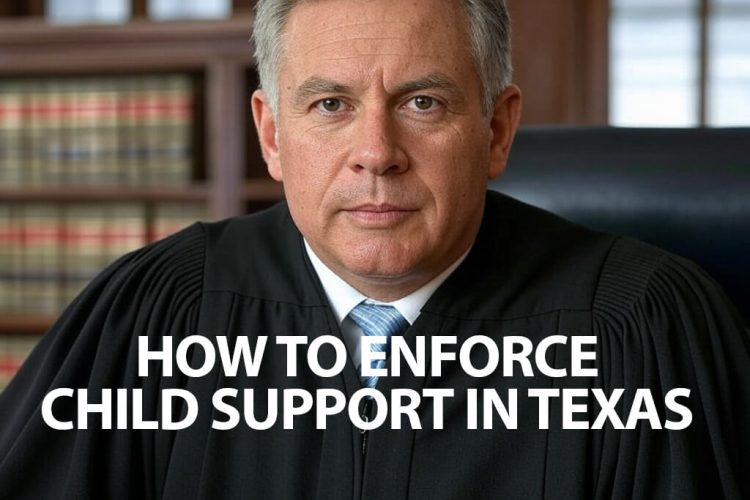Child Support Enforcement: A Practical Guide for Custodial Parents
Child support can be a lifeline, helping you provide for your children’s basic needs, from school supplies to groceries. But when those payments stop—or never arrive—it can leave you feeling frustrated, helpless, and unsure of where to turn. If you’re facing this situation, you’re not alone, and Texas has a variety of tools designed to help you recover what your children are owed.
This guide is here to show you the options available and how to use them effectively. Whether you’re dealing with unpaid child support or looking for ways to hold the other parent accountable, this article will help you understand your rights, take the next steps, and feel empowered throughout the process. From income withholding to tax refund interception and even property liens, there are solutions—even if it feels like you’ve hit a wall.
If you’re tired of struggling to make ends meet without the support your family needs, keep reading. There are ways to take action and regain control of your financial situation for the sake of your children’s future. Let’s explore what you can do today to move forward.
Income Withholding for Child Support
When a parent refuses to pay child support, income withholding is often the first and most effective step in ensuring regular payments. This process, where funds are deducted directly from the other parent’s paycheck, removes the need for you to constantly chase payments. Whether the parent is employed, receiving Social Security benefits, or even accessing retirement funds, Texas offers several ways to secure income for your child’s needs. Let’s explore how income withholding works and the types of payments that can be garnished.

What Is Income Withholding and How Does It Work?
Income withholding means your child’s other parent’s employer automatically deducts child support from their paycheck. This is one of the most straightforward ways to secure payments because it removes the burden of chasing down the money yourself. Once the court orders income withholding, the employer handles the deductions and sends the funds directly to the state, which then forwards them to you.
What About Social Security and Retirement Funds?
If the parent owes child support but isn’t currently working, their Social Security benefits could still be garnished—though it depends on the type. Benefits like Social Security Disability Insurance (SSDI) can be tapped for child support, but Supplemental Security Income (SSI) is generally off-limits. Similarly, retirement funds like pensions or 401(k)s can also be garnished if necessary. These measures are especially helpful when the other parent has assets but isn’t providing support.
What to Do If Income Withholding Isn’t Happening
If the other parent changes jobs or works under the table, you may need to inform the court or child support office to get withholding back on track. Keep records of missed payments, as they’ll be important in future enforcement efforts.
Intercepting Tax Refunds for Child Support
For parents owed child support, tax refund season can be a pivotal time. If the other parent is behind on payments, their federal or state tax refunds can be intercepted to cover arrears. This method often results in a significant payment toward what your child is owed, even if the parent has been avoiding other enforcement efforts. Here’s how the tax refund interception process works and what you can expect as a caretaker trying to collect unpaid child support.
How Tax Refund Interception Works
One of the most effective ways to recover unpaid child support is through tax refund interception. If the other parent is behind on payments, their federal or state tax refunds can be seized to cover the arrears. This process, managed through the Federal Tax Refund Offset Program, ensures that money owed to your children isn’t ignored during tax season.
Can This Really Help Me?
Yes! Many parents see significant arrears paid off through intercepted refunds. It’s not just about federal taxes; Texas also allows for state refund seizures. If the other parent owes a lot of back child support, this could be a game-changer in getting you what your family needs.
What If They Try to Avoid It?
Some non-compliant parents may try to reduce their tax refunds to avoid interception. If this happens, report it to your local child support office—they can investigate and take additional steps to secure payment.
What Happens When Licenses Are Suspended?
Losing a license—whether it’s for driving, work, or recreation—is one of the most impactful consequences a parent can face for failing to pay child support. Texas uses license suspension as a way to encourage compliance, as it can disrupt daily life enough to prompt action. Whether you’re requesting this enforcement measure or dealing with its fallout, it’s important to understand how license suspension works, how it can be avoided, and how the other parent can regain their privileges.
Losing Driving Privileges
Did you know that unpaid child support can result in losing a driver’s license? Texas takes this seriously, as a suspended license can pressure parents to get back on track. If the other parent isn’t paying, you can ask the state to initiate this process.
Professional and Recreational Licenses
This doesn’t stop at driving. Professional licenses (like those for doctors, contractors, or barbers) can also be suspended. Even recreational licenses for fishing or hunting might be revoked. These restrictions can disrupt the other parent’s life enough to prompt action—and they won’t be restored until payments are made.
How to Help Them Get Back on Track
While suspension might seem like punishment, it’s often a wake-up call. If the other parent wants to reinstate their license, they’ll need to show progress on their payments. This could mean setting up a payment plan or negotiating through the court.
What to Do If the Other Parent Ignores Court Orders
A court order for child support is legally binding, but some parents still choose to ignore it. If the other parent refuses to comply, you don’t have to face it alone. Texas courts have the authority to hold parents accountable through measures like fines, contempt charges, or even jail time. This section will explain how the legal system enforces child support orders, what penalties the other parent might face, and how you can push for action while keeping the process fair and effective.

Contempt of Court: What It Means for Them
If a parent refuses to pay child support, they can be held in contempt of court. Civil contempt means they could face fines or even jail time, while criminal contempt involves more serious penalties for willfully avoiding payments. Either way, this step is a way for courts to enforce orders and show that ignoring them isn’t an option.
How to Push for Contempt Charges
To request enforcement, you’ll need to file a motion with the court. It’s a good idea to document missed payments and any communication (or lack thereof) with the other parent. The court will review the case and decide whether penalties, such as fines or jail time, are warranted.
Can You Avoid Jail for the Other Parent?
Some caretakers hesitate to pursue contempt charges, worrying about jail time for their child’s other parent. If that’s the case, consider asking the court for alternative enforcement measures, like wage garnishment or property liens, instead.
Seizing Assets to Pay Child Support
When other enforcement tools fail, Texas can use asset seizure to recover unpaid child support. From placing liens on real estate to levying bank accounts or even seizing personal property, these measures ensure that parents who have the means to pay cannot avoid their responsibilities. While asset seizure can feel like a drastic step, it can be the key to recovering significant amounts of overdue payments. Let’s break down how this process works and what assets can be targeted to support your children’s financial needs.
How Property Liens Work
If the other parent owns property, the state can place a lien on it. This means they can’t sell or refinance the property until the child support debt is cleared. Real estate liens are a powerful tool for ensuring long-term payment.
Bank Account Levies
When property isn’t an option, child support enforcement can target bank accounts. Levies allow authorities to withdraw funds directly from the account to cover missed payments. While this might seem drastic, it’s an effective way to recover money owed.
What About Personal Property?
For more persistent cases, personal assets like cars or valuable belongings can be seized and sold to cover child support arrears. This might feel extreme, but it’s a last-resort option for securing the financial support your children need.
Step-by-Step Guidance for Starting Enforcement
When child support payments stop, taking clear and timely steps can help you secure what your children are owed. Here’s a breakdown of how to start enforcement in Texas:

1. Gather the Necessary Information
Make sure you have everything you need to file for enforcement:
- A copy of the court order that established child support.
- Records of missed payments, such as payment logs from the Texas Child Support Division or your bank statements.
- Any communication with the other parent about missed payments, if available.
2. File a Request with the Texas Child Support Division
The Office of the Attorney General (OAG) handles child support enforcement in Texas. You can request their assistance by:
- Submitting a formal request for enforcement online through their portal.
- Visiting a local OAG office or calling their helpline.
3. Work with Your Caseworker
Once your request is submitted, a caseworker will review the details and explain the next steps. This may involve income withholding, tax refund interception, or other enforcement actions.
4. Attend Any Required Hearings
In some cases, you may need to attend a court hearing. Be prepared to present your evidence and explain the situation to the judge. If the other parent disputes the claim, the court will mediate and determine appropriate actions.
5. Follow Up
Stay in contact with your caseworker and monitor your case’s progress. Enforcement can take time, especially if the other parent is actively avoiding payment, but persistence often leads to results.
Help for Parents Facing Financial Struggles
Child support enforcement isn’t just about pursuing unpaid funds; it also addresses situations where the paying parent faces genuine financial hardships. Texas provides options for both parents to manage child support obligations fairly while still meeting the child’s needs.
What If the Paying Parent Can’t Afford Payments?
If the other parent is struggling financially, they can request a modification to the child support order. This allows the court to adjust the payment amount based on their current income. Common scenarios include:
- Loss of a job or significant reduction in income.
- Unexpected medical expenses or other financial emergencies.
Encourage the other parent to file for a modification rather than letting payments lapse. Courts are more understanding when proactive steps are taken.
Programs to Support Struggling Parents
Texas offers programs that help non-paying parents get back on track:
- Job Placement Assistance: The Texas Workforce Commission often collaborates with the OAG to connect unemployed parents with job opportunities.
- Payment Plans: Parents who have fallen behind can set up manageable payment plans to address arrears without overwhelming their finances.
- Rehabilitative Programs: For parents with legal issues related to unpaid child support, Texas courts sometimes offer programs aimed at rehabilitation rather than punishment, including job training or financial literacy courses.
When Financial Struggles Are Genuine vs. Avoidance
It’s important to distinguish between parents who genuinely cannot pay and those who are intentionally avoiding responsibility. Enforcement measures, like license suspension or asset seizure, are typically reserved for parents who are unwilling to comply despite having the means to pay.
Resources for Receiving Parents in Financial Need
If unpaid child support is causing financial strain, you may qualify for temporary assistance while waiting for enforcement. Consider:
- Temporary Assistance for Needy Families (TANF): Cash support for low-income families.
- SNAP (Supplemental Nutrition Assistance Program): Help with grocery costs.
- Local Nonprofits and Community Organizations: Many offer free services like childcare, housing assistance, or legal aid.
Frequently Asked Questions (FAQ)
Will Enforcement Hurt My Co-Parenting Relationship?
It’s natural to worry about how enforcement actions might affect your relationship with your child’s other parent. While enforcement can create tension, remember that this is about ensuring your child’s well-being. If possible, communicate openly and calmly with the other parent about why enforcement is necessary. If emotions run high, consider involving a mediator to help resolve conflicts.
What Happens If the Other Parent Moves Out of State?
Texas can still enforce child support orders even if the other parent moves. The Uniform Interstate Family Support Act (UIFSA) allows states to work together to collect payments. The Texas OAG can coordinate with the child support office in the other state to ensure enforcement continues.
What Should I Do If the Other Parent is Self-Employed?
Collecting child support from a self-employed parent can be challenging, but it’s not impossible. The court may require the other parent to submit proof of income through tax returns or bank statements. You can also work with your caseworker to track non-traditional income sources, such as gig work or under-the-table earnings.
How Do I Make Sure My Case Gets Attention?
Be proactive and organized. Submit all required documents promptly, follow up with your caseworker regularly, and keep detailed records of missed payments and enforcement progress. Persistent communication shows the system you’re serious about getting results.
What Are Common Mistakes to Avoid?
- Not Reporting Missed Payments: Inform the OAG as soon as payments stop to start enforcement.
- Relying on Verbal Agreements: Stick to the court order. Verbal agreements can’t be enforced.
- Letting Arrears Accumulate Too Long: Address unpaid support as soon as possible. The longer you wait, the harder it may be to collect.
How Can I Protect My Children During This Process?
Child support enforcement is about protecting your children’s rights, but it can still cause stress in your family. Reassure your kids that the situation isn’t their fault and that you’re working to ensure their needs are met. Try to shield them from any conflict with the other parent.
Final Thoughts
Child support enforcement in Texas offers multiple tools to help you recover what your children are owed. Whether it’s working with the OAG to set up income withholding or intercepting tax refunds, these steps are designed to prioritize your child’s financial security. If the other parent is struggling to pay, there are also options to work toward a resolution that keeps their obligations manageable. By staying informed and persistent, you’re advocating for your child’s future while taking meaningful steps toward stability for your family.

